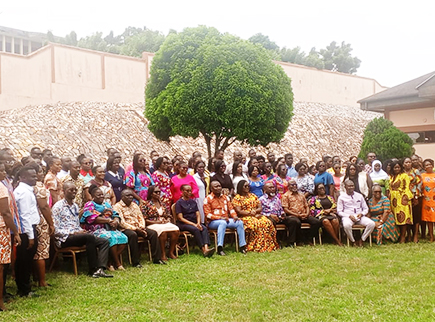The Ghana Health Service (GHS) has rallied the collaboration of the public to support its operations of the novel Obstetric Triage Implementation Package (OTIP) at 76 health facilities across the country.
Aimed at diminishing maternal and neonatal mortality rates, the OTIP process uses a straightforward, yet effective methodology utilising colour-coded wristbands to prioritise pregnant women based on the severity of their conditions by specially trained health personnel.
It encompasses an initial screening and assessment of patients according to the urgency and gravity of their medical situations, ensuring that those in critical need receive prompt care, while others are attended to in an orderly manner.
Generally, the new approach represents a change from the known practice, where patients particularly pregnant women in distress had to wait in long queues to be seen by a medical doctor, regardless of the urgency of their health condition.

Dr Francis Wuobar, an Obstetrician Gynaecologist and OTIP instructor indicated that the medical innovation in just six months of service had significantly enhanced patient assessment times, with over 85 per cent of women being triaged within a mere 10 minutes.
Notably, he said OTIP had refined care planning and contributed to the prevention of many maternal fatalities by guaranteeing timely treatment for high-risk pregnancies upon their arrival at the hospital.
Dr Wuobar gave these insights at the Southern Ghana OTIP learning conference convened for 26 health facilities across the Greater Accra, Eastern, Western and Central Regions.
The forum provided an opportunity for various facility managers to exchange experiences regarding the challenges, successes and exemplary practices associated with OTIP implementation.
The facilities utilised standardised assessment forms and other tools to articulate their progress in identifying and promptly treating women in urgent need of care.
The conference incorporated scenario-based role-play and additional methodologies to equip midwives and medical professionals.
Supported by Canada through the Kybele Health Outreach, the initiative, which commenced earlier this year, is part of broader efforts to realise the Sustainable Development Goals.
Dr Buobar urged patients to always provide accurate information, comprehend triage procedures and adhere to guidance which remained pivotal for the system to operate effectively.
He further elucidated that delays in patients receiving appropriate care upon arriving at a health facility accounted for a significant proportion of maternal and newborn deaths.
He urged pregnant women to always seek early medical attention instead of holding to cultural beliefs and negative experiences of people, that could jeopardise their health.

“The delays in reaching health facilities are frequently exacerbated by distance, inadequate transportation, exorbitant costs, and financial constraints and geographical barriers, particularly affecting those residing in rural areas.
“The OTIP intervention is timely to support all,” he assured.
Dr Lawrence Ofori Boadu, the Director of Institutional Care Development at the GHS, told the Ghana News Agency on the sidelines of the programme that the practice would be incorporated into the national health emergency policy and gradually expanded to include other high-patient-volume health facilities.
Additionally, he said, the GHS would allocate a budget for this initiative, establish supervision and evaluation mechanisms to ensure its effectiveness and urged the public to offer their support.
Several facilitating managers, including those from the Prestea Government Hospital in the Western Region, LEKMA Hospital in Greater Accra, and Winneba Trauma and Specialist Hospital in the Central Region, complained about the lack of logistics and personnel needed for effective service delivery.
